Updated at 7:48 p.m.
Gov. Phil Scott on Tuesday outlined his $6.8 billion budget proposal for the coming year, noting in his annual address to the general assembly that the state was sitting on an unexpected $210 million surplus.
The rosy budget picture, buoyed by federal COVID-19 relief funds, was in stark contrast with dire predictions made earlier last year of a major deficit. But Scott, a Republican, urged lawmakers to spend the one-time windfall wisely and to avoid the temptation to expand programs the state may be unable to afford once the infusion of federal relief funds dries up.
The total budget is slightly lower than the current fiscal year’s $7.2 billion. That’s because the state booked nearly $900 million in federal relief funds this year, while next year’s budget does not assume any comparable boost.
The governor told legislators to seize the surplus to invest in broadband and schools, build new housing and revitalize downtowns, and pursue other initiatives to put the state on better economic footing to recover from the pandemic.
“If we’re cautious, we can solve problems and fund projects that have been stalled for years, improving communities, services, outcomes and state government itself, and lay the foundation for an economic resurgence around the state, without having to ask more from taxpayers to do so,” Scott said.
The fact that the state has a budget surplus at all is remarkable given the grim forecasts state economists made last spring. With businesses shut down and unemployment soaring in May, they predicted a $430 million plunge in revenues.
But the infusion of billions of federal dollars, including Paycheck Protection Program grants to businesses and direct cash relief for families, have spilled over into better-than-expected corporate and personal tax returns.
Sales taxes have also gotten a particular boost from higher e-commerce sales as more people shop online during the pandemic. The state has newfound ability to tax such sales, which Department of Taxes Commissioner Craig Bolio called “huge” during a call with reporters before Scott's address.
E-commerce sales taxes are up about $10 million from the prior year, he said, a trend that is expected to continue.
As the months passed, financial forecasts improved, culminating in a recent economic update that blew away the remaining clouds on this year’s budget horizon.
“At the end of last week, we were quite surprised to see … our revenue upgrade far exceeded anything that any of us had expected, including our economists,” Administration Secretary Susanne Young told reporters.
As a result, the state will not have to dip into its reserves, leaving the surplus available for the governor’s strategic investments. Though relieved, administration officials stressed how important it was for lawmakers and the public to understand how fleeting the good news could be.
“This budget is bipolar,” said Adam Greshin, commissioner of the Department of Finance and Management. “On the one hand, we have the rocket fuel from the federal government we’ve poured into the new initiatives. On the other hand, we have the 87 octane that we put in our base to keep us on the road.”
Scott proposed spending the surplus in a number of ways, including:
- $53 million to modernize the state’s aging IT system.
- $25 million for weatherization efforts for low- to moderate-income residents.
- $20 million to expand broadband connectivity, including $16 million to local utility districts.
- $20 million to the Vermont Housing & Conservation Board to boost affordable housing funds.
- $10 million to boost outdoor recreation, with $5 million for parks and trail improvements and $5 million for recreation infrastructure.
- $10 million to support community solar projects designed to make solar more affordable.
- $1 million in additional tourism spending.
The overall budget also includes $100 million to fully fund pension obligations; $20 million extra for state colleges; $500,000 to professionalize the Natural Resources Board; and funds to increase staff in the Office of Racial Equity and to expand the remote worker program to attract new Vermonters to the state.
Reaction to the address from legislative leaders was generally positive but mixed. Senate President Pro Tempore Becca Balint (D-Windham) said she was pleased to hear Scott reflect on the violence in Washington, D.C., and to acknowledge the need for a return to a spirit of bipartisanship.
“He said it’s a conversation between the two branches — that is music to my ears, and I hope that he will stick to that,” Balint said.
She stressed, however, that the legislature has an important oversight role. While many of the programs Scott cited are certainly needed, Balint said, lawmakers may make different choices, especially if there's additional federal dollars from a new president and Democratically controlled Congress.
“It’s not partisan to look at a budget and make different choices,” Balint said.
She noted, for example, that there did not seem to be additional funding for mental health services in the state, which she said Vermonters desperately need.
Republican members of the House applauded Scott for his focus on leading the recovery from COVID-19 and growing the economy, particularly doing so within the state's means.
“Governor Scott's commitment to not raising taxes on Vermonters during an economic downturn is a position widely shared by House Republicans,” House Minority Leader Pattie McCoy (R-Poultney) said in a statement.
House Speaker Jill Krowinski (D-Burlington) said she and other lawmakers were “honestly horrified” at the scale of the budget impacts facing them last year.
“The fact that we are starting this conversation with about $210 million in one-time money just feels like a one-in-a-lifetime opportunity,” Krowinski said.
While she agreed with the importance of broadband and housing investments, Krowinski said she wasn’t sure one of her priorities, improving access to affordable childcare, received enough attention from the governor.
Scott’s budget includes some property tax breaks for childcare centers, as well as $3 million from expanding the lottery through new games such as Keno, which the legislature has not approved. Krowinski said funding childcare through gambling “raises some concern for me.”
“We need to get some more information about that,” she said.
Several groups that have been critical of the governor’s environmental record, including the Vermont Natural Resources Council, Vermont Conservation Voters and Renewable Energy Vermont, sang his praises after the speech.
In addition to support for weatherization and community solar, Scott’s budget includes $20 million to clean up brownfields, $5 million to speed the adoption of electric and fuel-efficient vehicles, and the purchase of seven electric transit buses.
“We are pleased to see the Governor’s strong commitment to investing in Vermont’s communities. These expenditures are especially important as we recover from the COVID-19 pandemic and prepare for other health, economic, and environmental challenges that lie ahead,” Brian Shupe, VNRC executive director, said in a statement.






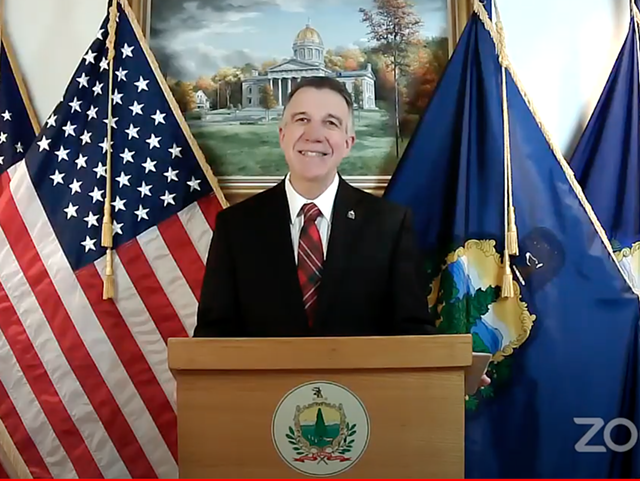
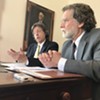

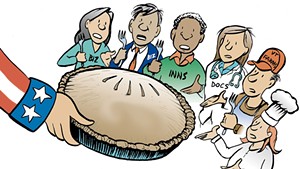
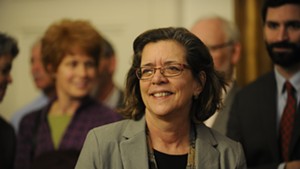
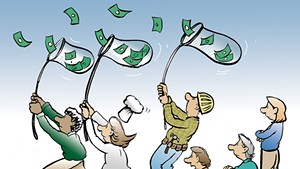





Comments
Comments are closed.
From 2014-2020, Seven Days allowed readers to comment on all stories posted on our website. While we've appreciated the suggestions and insights, right now Seven Days is prioritizing our core mission — producing high-quality, responsible local journalism — over moderating online debates between readers.
To criticize, correct or praise our reporting, please send us a letter to the editor or send us a tip. We’ll check it out and report the results.
Online comments may return when we have better tech tools for managing them. Thanks for reading.